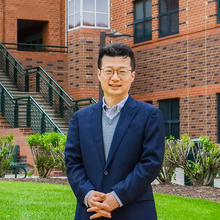- November 19, 2024
The 2008 financial crisis cast a pall of pessimism over veteran CEOs that took three years to lift. David Koo, assistant professor of accounting, has found that memories of past recessions, triggered by recent ones, can weigh on chief executives’ decisions, literally for years.
- October 1, 2024
Not all organizations measure success in dollars and cents. There are also the purists, whose unswerving integrity may deliver outsized market benefits—if they aren’t fatally misunderstood first.
- September 4, 2024
Thanking someone in advance for something you’re asking them to do increases their motivation and commitment to the task. This savvy managerial technique also raises some tricky ethical questions.
- May 30, 2024
The Greg and Camille Baroni Center for Government Contracting is working with the federal government to reform the military’s Cold War-era processes for tech development.
- April 29, 2024
The executive director of George Mason’s government contracting research center highlights “agile acquisition” as the key to beefing up national defense.
- April 5, 2024
You can spend millions to buy a company for its employees, but how do you know they’ll stay put? Now, AI can predict post-deal turnover with a startling degree of accuracy. In a recently working paper, Jingyuan Yang, an information systems and operations management professor at the Costello College of Business at George Mason University, discovers how to efficiently predict employee turnover using an innovative AI-driven approach
- January 22, 2024
To stay competitive in the war for talent, tech companies must weigh secrecy against specificity when crafting job ads. Are they disclosing too much?
- September 18, 2023
When government contractors merge, comparing their customers can predict a lot about how investors will respond to the deal.
- September 15, 2023
It’s not the combined skill level of the team that counts, so much as the chemistry (or lack thereof) between the members.
- October 12, 2022
Corporate social responsibility (CSR) has been on the business leadership agenda for more than 50 years, yet executives and corporate boards still demand to see the "business case" for CSR. Clearly, CSR’s familiarity as a concept has not translated into coherent ideas of where it fits into the cost-benefit calculations that motivate business strategy. A forthcoming article in the Journal of Financial and Quantitative Analysis by Lei Gao, associate professor of finance at George Mason University School of Business, Jie (Jack) He (of University of Georgia) and Juan (Julie) Wu (of University of Nebraska – Lincoln) goes beyond the business case to form cause-and-effect connections involving companies’ CSR efforts.










